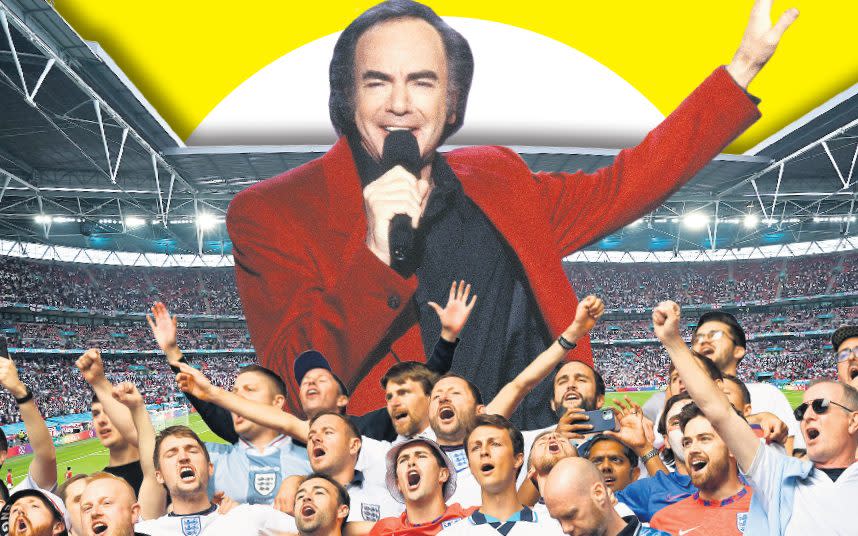How did Sweet Caroline become the world’s favourite sporting anthem?

Before every major football tournament of the last two decades, the same question always tends to crop up among the chat about penalties, golden generations and holding midfielders: When, oh when, are England fans going to find something new to sing instead of Three Lions?
Well, anybody planning on watching The Euros final on Sunday night will know that a new contender has made itself known: an easily sung soft rock karaoke classic written by the son of Jewish immigrants in New York, written more than half a century ago. It’s a funny old game.
Neil Diamond’s Sweet Caroline has followed the England team throughout recent major tournaments like a good luck charm.
Why do England fans sing Sweet Caroline?
It wasn’t until the Nineties that sports fans noticed its charms. It was in that decade that music was routinely played in stadiums and Carolina Panthers, an NFL team from Charlotte, North Carolina, started playing the song at every home game, since its chorus sounded like an ode to their state.
The following year, the Boston Red Sox baseball team adopted it, too. The man himself knew how significant it was becoming: when the Red Sox’s home ground, Fenway Park, reopened in 2010, Diamond performed the song live. Even if his vocals weren’t always on point, he made up for it with hammy fist-pumps. “I think they consider it good luck,” he told the Associated Press.
In the years since, it’s taken off around the world. The Sydney Swans AFL team play it. Castleford Tigers, the rugby league side, play it. The England cricket team celebrated their World Cup win in 2019 with champagne and a few rousing choruses of Diamond’s tune, while prosecco-drenched spectators have been known to give it a go at Lord’s. Arsenal blared the tune in 2017 to mark their FA Cup semi-final victory at Wembley (and had to issue a response after fans questioned why it had been played to mark their success for two games in a row). Aston Villa began singing it at a match against Stoke City in 2019. After that draw, they went on a 12-game unbeaten run. The song became a charm, and now England football fans think it’s doing the same.
What is Sweet Caroline about?
Not bad for a simple love song written from the perspective of somebody who can’t believe just how their life has improved since meeting somebody. For years, legend had it that Diamond wrote the song in 1969 as an ode to Caroline Kennedy, the only surviving daughter of Jackie and John F Kennedy, who was nine at the time.
It wasn’t quite true. “I was writing a song in Memphis, Tennessee, for a session. I needed a three-syllable name,” Diamond explained on an appearance on Today in 2014. “The song was about my wife at the time. Her name was Marciaa, and I couldn’t get a ‘Marciaa’ rhyme.”
Stuck on that particular conundrum in a hotel room, Diamond saw a picture of Caroline Kennedy in a magazine. “It was a little girl dressed to the nines in her riding gear, next to her pony. It was such an innocent, wonderful picture,” he once said. Caroline worked, so Caroline Marcia became. 13 years ago, Diamond performed the song for Kennedy at her 50th birthday, as a thank you for inspiring his biggest hit.
Sweet Caroline was successful – number four in the US, number eight in the UK, certified gold within months – but it was its singalong simplicity that made it such a crowd favourite. Diamond’s fans would sing it whilst waiting for other songs and well-oiled karaoke singers would know they had a banker when they selected it.
There’s no exact formula for a song being recast as a sports anthem, says Neil McCormick, The Telegraph’s music critic. “I think it’s something inherent in the melody and the rhythmic flow that makes it easy for massive crowds to sing, with a punchy swagger reflecting a victorious feeling,” he says.
In the case of Sweet Caroline, he adds:“Unusually it is the non-lyrical musical punctuation – ‘dum dum dum’ – that gets the biggest crowd moment. Such a joyous and simple musical phrase anyone can join in with, even if they don’t have a note in their voice.”
Then, of course, comes the triumph, which means the song rarely fits with a loss. “‘Good times never seemed so good’ – which, isolated from a song remembering a girl called Caroline, becomes a celebration,” says McCormick. It’s a line fans usually follow with the fist-pumping “So good! So good! So good!”.
Indeed very few sporting anthems actually make mention of the game. Liverpool FC’s beloved You’ll Never Walk Alone, originally a show tune from Carousel but adopted by the club’s fans after local group Gerry and the Pacemakers had a hit with it in 1963, certainly doesn’t. Nor does Tom Jones’s Delilah, so beloved of Welsh fans.
Hands, reaching out, a big shouty lead line, the “dum dum dum” and good times: in some ways, Diamond wrote the perfect crowd participation chorus in that hotel room 52 years ago. For England fans, times have never seemed so good. Here’s hoping we’re singing it again on Saturday.

